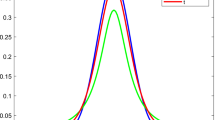Abstract
A single strategy used in the firefly algorithm (FA) cannot effectively solve the complex optimal scheduling problem. Thus, we propose the FA with division of roles (DRFA). Herein, fireflies are divided into leaders, developers, and followers, while a learning strategy is assigned to each role: the leader chooses the greedy Cauchy mutation; the developer chooses two leaders randomly and uses the elite neighborhood search strategy for local development; the follower randomly selects two excellent particles for global exploration. To improve the efficiency of the fixed step size used in FA, a stepped variable step size strategy is proposed to meet different requirements of the algorithm for the step size at different stages. Role division can balance the development and exploration ability of the algorithm. The use of multiple strategies can greatly improve the versatility of the algorithm for complex optimization problems. The optimal performance of the proposed algorithm has been verified by three sets of test functions and a simulation of optimal scheduling of cascade reservoirs.
摘要
针对萤火虫算法使用单一学习策略无法有效求解复杂优化调度问题的不足, 本文提出一种角色分工萤火虫算法。算法将萤火虫划分为领导者、开发者和跟随者3种角色, 并为每种角色分配一种学习策略。领导者使用贪婪柯西突变, 开发者随机选择两个领导者使用精英邻域搜索策略局部开发, 跟随者随机选择两个优秀粒子进行全局探索。同时, 为改善萤火虫算法使用固定步长的不足, 提出阶梯变步长策略, 以满足算法不同阶段对步长的需求。角色划分可平衡算法的开发与探索能力, 多策略的使用能极大提高算法面对复杂优化问题的普适性。通过3组测试函数和一个梯级水库优化调度的仿真实验, 验证了该算法的优化性能。
Similar content being viewed by others
Explore related subjects
Discover the latest articles and news from researchers in related subjects, suggested using machine learning.References
Alomoush W, Omar K, Alrosan A, et al., 2020. Firefly photinus search algorithm. J King Univ-Comput Inform Sci, 32(5):599–607. https://doi.org/10.1016/j.jksuci.2018.06.010
Arunachalam S, AgnesBhomila T, Ramesh Babu M, 2014. Hybrid particle swarm optimization algorithm and firefly algorithm based combined economic and emission dispatch including valve point effect. Proc 5th} Int Conf on Swarm, Evolutionary, and Memetic Computing, p.647–660. https://doi.org/10.1007/978-3-319-20294-5_56
Aydilek IB, 2018. A hybrid firefly and particle swarm optimization algorithm for computationally expensive numerical problems. Appl Soft Comput, 66:232–249. https://doi.org/10.1016/j.asoc.2018.02.025
Brest J, Maučec MS, 2011. Self-adaptive differential evolution algorithm using population size reduction and three strategies. Soft Comput, 15(11):2157–2174. https://doi.org/10.1007/s00500-010-0644-5
Chen Q, Liu B, Zhang Q, et al., 2015. Problem definitions and evaluation criteria for CEC 2015 Special Session on Bound Constrained Single-Objective Computationally Expensive Numerical Optimization. Proc IEEE Congress on Evolutionary Computation, p.84–88.
Cook SA, 1971. The complexity of theorem-proving procedures. Proc 3rd} Annual ACM Symp on Theory of Computing, p.151–158. https://doi.org/10.1145/800157.805047
Cui ZH, Cao Y, Cai XJ, et al., 2019. Optimal LEACH protocol with modified bat algorithm for big data sensing systems in Internet of Things. J Parall Distrib Comput, 132:217–229. https://doi.org/10.1016/j.jpdc.2017.12.014
Fan TH, Yao ZF, Han LZ, et al., 2021. Density peaks clustering based on k-nearest neighbors sharing. Concurr Comput Pract Exp, 33(5):e5993. https://doi.org/10.1002/cpe.5993
Fister I, Fister I Jr, Yang XS, et al., 2013. A comprehensive review of firefly algorithms. Swarm Evol Comput, 13:34–46. https://doi.org/10.1016/j.swevo.2013.06.001
Fister I Jr, Yang XS, Fister I, et al., 2012. Memetic firefly algorithm for combinatorial optimization. Mathematics, 2012:75–86.
Gao WF, Chan FTS, Huang LL, et al., 2015. Bare bones artificial bee colony algorithm with parameter adaptation and fitness-based neighborhood. Inform Sci, 316:180–200. https://doi.org/10.1016/j.ins.2015.04.006
García S, Molina D, Lozano M, et al., 2009. A study on the use of non-parametric tests for analyzing the evolutionary algorithms’ behaviour: a case study on the CEC’2005 Special Session on Real Parameter Optimization. J Heurist, 15(6):617–644. https://doi.org/10.1007/s10732-008-9080-4
Gope S, Goswami AK, Tiwari PK, et al., 2016. Rescheduling of real power for congestion management with integration of pumped storage hydro unit using firefly algorithm. Int J Electr Power Energy Syst, 83:434–442. https://doi.org/10.1016/j.ijepes.2016.04.048
Guo BY, Zhuang ZJ, Pan JS, et al., 2021. Optimal design and simulation for PID controller using fractional-order fish migration optimization algorithm. IEEE Access, 9:8808–8819. https://doi.org/10.1109/ACCESS.2021.3049421
Jadon SS, Bansal JC, Tiwari R, et al., 2015. Accelerating artificial bee colony algorithm with adaptive local search. Memet Comput, 7(3):215–230. https://doi.org/10.1007/s12293-015-0158-x
Kassandra T, Rojali, Suhartono D, 2018. Resource-constrained project scheduling problem using firefly algorithm. Proc Comput Sci, 135:534–543. https://doi.org/10.1016/j.procs.2018.08.206
Kennedy J, Eberhart R, 1995. Particle swarm optimization. Proc Int Conf on Neural Networks, p.1942–1948. https://doi.org/10.1109/ICNN.1995.488968
Kiran MS, Hakli H, Gunduz M, et al., 2015. Artificial bee colony algorithm with variable search strategy for continuous optimization. Inform Sci, 300:140–157. https://doi.org/10.1016/j.ins.2014.12.043
Kora P, Krishna KSR, 2016. Hybrid firefly and particle swarm optimization algorithm for the detection of bundle branch block. Int J Cardiov Acad, 2(1):44–48. https://doi.org/10.1016/j.ijcac.2015.12.001
Liang JJ, Qin AK, Suganthan PN, et al., 2006. Comprehensive learning particle swarm optimizer for global optimization of multimodal functions. IEEE Trans Evol Comput, 10(3): 281–295. https://doi.org/10.1109/TEVC.2005.857610
Lloyd JE, 1971. Bioluminescent communication in insects. Ann Rev Entomol, 16:97–122. https://doi.org/10.1146/annurev.en.16.010171.000525
Lv L, Zhao J, 2018. The firefly algorithm with Gaussian disturbance and local search. J Signal Process Syst, 90(8–9): 1123–1131. https://doi.org/10.1007/s11265-017-1278-y
Lv L, Zhao J, Wang JY, et al., 2019. Multi-objective firefly algorithm based on compensation factor and elite learning. Fut Gener Comput Syst, 91:37–47. https://doi.org/10.1016/j.future.2018.07.047
Lv L, Wang JY, Wu RX, et al., 2021. Density peaks clustering based on geodetic distance and dynamic neighbourhood. Int J Bio-Inspir Comput, 17(1):24–33. https://doi.org/10.1504/IJBIC.2021.113363
Meng ZY, Pan JS, Xu HR, 2016. QUasi-Affine TRansformation Evolutionary (QUATRE) algorithm: a cooperative swarm based algorithm for global optimization. Knowl-Based Syst, 109:104–121. https://doi.org/10.1016/j.knosys.2016.06.029
Moeini R, Babaei M, 2020. Hybrid SVM-CIPSO methods for optimal operation of reservoir considering unknown future condition. Appl Soft Comput, 95:106572. https://doi.org/10.1016/j.asoc.2020.106572
Ohba N, 2004. Flash communication systems of Japanese fireflies. Integr Comp Biol, 44(3):225–233. https://doi.org/10.1093/icb/44.3.225
Pan JS, Liu NX, Chu SC, et al., 2020. An efficient surrogateassisted hybrid optimization algorithm for expensive optimization problems. Inform Sci, 561:304–325. https://doi.org/10.1016/j.ins.2020.11.056
Pan JS, Sun XX, Chu SC, et al., 2021. Digital watermarking with improved SMS applied for QR code. Eng Appl Artif Intell, 97:104049. https://doi.org/10.1016/j.engappai.2020.104049
Ritthipakdee A, Thammano A, Premasathian N, et al., 2017. Firefly mating algorithm for continuous optimization problems. Comput Intell Neurosci, 2017:8034573. https://doi.org/10.1155/2017/8034573
Song PC, Chu SC, Pan JS, et al., 2020. Phasmatodea population evolution algorithm and its application in length-changeable incremental extreme learning machine. Proc 2nd} Int Conf on Industrial Artificial Intelligence, p.1–5. https://doi.org/10.1109/IAI50351.2020.9262236
Sun H, Deng ZC, Zhao J, et al., 2019. Hybrid mean center opposition-based learning particle swarm optimization. Acta Electron Sin, 47(9):1809–1818 (in Chinese). https://doi.org/10.3969/j.issn.0372-2112.2019.09.001
Takeuchi M, Matsushita H, Uwate Y, et al., 2015. Firefly algorithm distinguishing between males and females for minimum optimization problems. Proc IEEE Workshop on Nonlinear Circuit Networks, p.50–51.
Tian AQ, Chu SC, Pan JS, et al., 2020. A compact pigeon-inspired optimization for maximum short-term generation mode in cascade hydroelectric power station. Sustainability, 12(3):767. https://doi.org/10.3390/su12030767
Wang CF, Song WX, 2019. A novel firefly algorithm based on gender difference and its convergence. Appl Soft Comput, 80:107–124. https://doi.org/10.1016/j.asoc.2019.03.010
Wang GG, Cai XJ, Cui ZH, et al., 2020. High performance computing for cyber physical social systems by using evolutionary multi-objective optimization algorithm. IEEE Trans Emerg Top Comput, 8(1):20–30. https://doi.org/10.1109/TETC.2017.2703784
Wang H, Sun H, Li CH, et al., 2013. Diversity enhanced particle swarm optimization with neighborhood search. Inform Sci, 223:119–135. https://doi.org/10.1016/j.ins.2012.10.012
Wang H, Wang WJ, Sun H, et al., 2016. Firefly algorithm with random attraction. Int J Bio-Inspir Comput, 8(1):33–41. https://doi.org/10.1504/IJBIC.2016.074630
Wang H, Zhou XY, Sun H, et al., 2017a. Firefly algorithm with adaptive control parameters. Soft Comput, 21(17):5091–5102. https://doi.org/10.1007/s00500-016-2104-3
Wang H, Cui ZH, Sun H, et al., 2017b. Randomly attracted firefly algorithm with neighborhood search and dynamic parameter adjustment mechanism. Soft Comput, 21(18): 5325–5339. https://doi.org/10.1007/s00500-016-2116-z
Wang Y, Cai ZX, Zhang QF, 2011. Differential evolution with composite trial vector generation strategies and control parameters. IEEE Trans Evol Comput, 15(1):55–66. https://doi.org/10.1109/TEVC.2010.2087271
Wu HS, Xue JJ, Xiao RB, et al., 2020. Uncertain bilevel knapsack problem based on an improved binary wolf pack algorithm. Front Inform Technol Electron Eng, 21(9):1356–1368. https://doi.org/10.1631/FITEE.1900437
Wu N, 2020. Research on Scheduling Optimization Models and Corresponding Algorithms for Container Terminal under Abnormal Working Conditions. PhD Thesis, Dalian Maritime University, Dalian, China (in Chinese).
Xiao RB, Wang YC, 2018. Labour division in swarm intelligence for allocation problems: a survey. Int J Bio-Inspir Comput, 12(2):71–86. https://doi.org/10.1504/IJBIC.2018.094186
Xiao RB, Zhang YF, Huang ZD, 2015. Emergent computation of complex systems: a comprehensive review. Int J Bio-Inspir Comput, 7(2):75–97. https://doi.org/10.1504/IJBIC.2015.069292
Xu JG, Dai GZ, Wang HA, 2004. An overview of theories and methods of production scheduling. J Comput Res Dev, 41(2):257–267 (in Chinese).
Yang XS, 2008. Nature-Inspired Metaheuristic Algorithms. Luniver Press, Frome, UK.
Yang XS, 2010. Engineering Optimization: an Introduction with Metaheuristic Applications. John Wiley & Sons, Hoboken, US.
Yu BH, Wang JW, Li CL, et al., 2004. DP with successive approximation for solving hydropower unit commitment problem. Centr China Electr Power, 17(6):1–3 (in Chinese). https://doi.org/10.3969/j.issn.1006-6519.2004.06.001
Yu SH, Su SB, Lu QP, et al., 2014. A novel wise step strategy for firefly algorithm. Int J Comput Math, 91(12):2507–2513. https://doi.org/10.1080/00207160.2014.907405
Yu SH, Zhu SL, Ma Y, et al., 2015. A variable step size firefly algorithm for numerical optimization. Appl Math Comput, 263:214–220. https://doi.org/10.1016/j.amc.2015.04.065
Zhang HW, Xie JW, Lu WL, et al., 2017. A scheduling method based on a hybrid genetic particle swarm algorithm for multifunction phased array radar. Front Inform Technol Electron Eng, 18(11):1806–1816. https://doi.org/10.1631/FITEE.1601358
Zhang JQ, Sanderson AC, 2009. JADE: adaptive differential evolution with optional external archive. IEEE Trans Evol Comput, 13(5):945–958. https://doi.org/10.1109/TEVC.2009.2014613
Zhang MQ, Wang H, Cui ZH, et al., 2018. Hybrid multi-objective cuckoo search with dynamical local search. Memet Comput, 10(2):199–208. https://doi.org/10.1007/s12293-017-0237-2
Zhao J, Fan TH, Lü L, et al., 2017a. Adaptive intelligent single particle optimizer based image de-noising in shearlet domain. Intell Autom Soft Comput, 23(4):661–666. https://doi.org/10.1080/10798587.2017.1316069
Zhao J, Lv L, Wang H, et al., 2017b. Particle swarm optimization based on vector Gaussian learning. KSII Trans Intern Inform Syst, 11(4):2038–2057. https://doi.org/10.3837/TIIS.2017.04.012
Zhao J, Xie ZF, Lü L, et al., 2018. Firefly algorithm with deep learning. Acta Electron Sin, 46(11):2633–2641 (in Chinese). https://doi.org/10.3969/j.issn.0372-2112.2018.11.010
Zhao J, Chen WP, Ye J, et al., 2020. Firefly algorithm based on level-based attracting and variable step size. IEEE Access, 8:58700–58716. https://doi.org/10.1109/ACCESS.2020.2981656
Zhao J, Yao ZF, Lü L, et al., 2021. Density peaks clustering based on mutual neighbor degree. Contr Dec, 36(3):543–552. https://doi.org/10.13195/j.kzyjc.2019.0795
Zhou XY, Wang H, Wang MW, et al., 2017. Enhancing the modified artificial bee colony algorithm with neighborhood search. Soft Comput, 21(10):2733–2743. https://doi.org/10.1007/s00500-015-1977-x
Zou DX, Wang GG, Pan G, et al., 2016. A modified simulated annealing algorithm and an excessive area model for floorplanning using fixed-outline constraints. Front Inform Technol Electron Eng, 17(11):1228–1244. https://doi.org/10.1631/FITEE.1500386
Author information
Authors and Affiliations
Corresponding author
Additional information
Project supported by the National Science and Technology Innovation 2030 Major Project of the Ministry of Science and Technology of China (No. 2018AAA0101200), the National Natural Science Foundation of China (Nos. 52069014 and 51669014), and the Science Foundation for Distinguished Young Scholars of Jiangxi Province, China (No. 2018ACB21029)
Contributors
Renbin XIAO designed the research. Jia ZHAO and Jun YE processed the data. Wenping CHEN drafted the manuscript. Renbin XIAO helped organize the manuscript. Wenping CHEN and Jia ZHAO revised and finalized the paper.
Compliance with ethics guidelines
Jia ZHAO, Wenping CHEN, Renbin XIAO, and Jun YE declare that they have no conflict of interest.
Jia ZHAO, first author of this invited paper, received his ME degree in computer application technology from Nanchang Hangkong University, Nanchang, China, in 2011, and PhD degree in information and communication engineering from Hohai University, Nanjing, China, in 2020. He is currently a full professor with the School of Information Engineering, Nanchang Institute of Technology, Nanchang, China. He is Director of the Nanchang Key Laboratory of Big Data and Computational Intelligence. His research interests include big data analysis and artificial intelligence theory.
Renbin XIAO, corresponding author of this invited paper, received his PhD degree in systems engineering from Huazhong University of Science and Technology (HUST), Wuhan, China, in 1993. He is currently a full professor with the School of Artificial Intelligence and Automation, HUST. He has coauthored more than 10 books and published over 300 academic papers. He received 10 projects from the National Natural Science Foundation of China and won five science and technology awards from the Ministry of Education and Hubei Province, China. His research interests include swarm intelligence, emergent computation, intelligent manufacturing, and innovation design of complex products.
Rights and permissions
About this article
Cite this article
Zhao, J., Chen, W., Xiao, R. et al. Firefly algorithm with division of roles for complex optimal scheduling. Front Inform Technol Electron Eng 22, 1311–1333 (2021). https://doi.org/10.1631/FITEE.2000691
Received:
Accepted:
Published:
Issue Date:
DOI: https://doi.org/10.1631/FITEE.2000691




